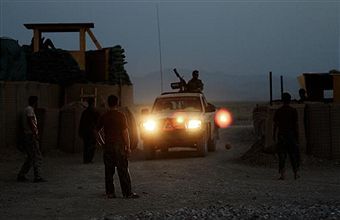 The proverbial shoe is dropping. Following General Stanley McChrystal’s forced
retirement, a consensus is forming that President Obama’s Afghan strategy is not working. The Economist says:
The proverbial shoe is dropping. Following General Stanley McChrystal’s forced
retirement, a consensus is forming that President Obama’s Afghan strategy is not working. The Economist says:
In the Financial Times, Ahmed Rashid makes a similar point, arguing that the military strategy in Afghanistan is “failing”.‘Since November, when Mr Obama promised 30,000 more of his country’s soldiers to the campaign, little has gone right. General McChrystal’s plan was for a “surge” that would seize the initiative from the Taliban and create the scope for Afghanistan’s government, backed by its army and police, to take charge. In practice that has not happened.’
Everyone bar the US government is now coming round to the idea, which I wrote about in early 2008, long before anyone was contemplating the mission’s failure, that some form of negotiations with the Taliban insurgency is required. But saying that negotiations are necessary is not, as some now seem to believe, a magical formula, which, once said, makes all the problems go away. There are question of who to negotiate with, how to coordinate oneself, how to ensure that as the Taliban walk into the tent the Northern Alliance does not walk out.‘The real crisis, however, is that the US-Nato strategy in southern Afghanistan has barely made a dent in the Taliban’s resistance, which is spreading across the country. Nato’s offensive in Marjah, in Helmand, is five months old and still has not secured the area. The anticipated surge to secure Kandahar province has been postponed due to the Taliban’s penetration of the region. Seventy-nine Nato soldiers have been killed in June so far – the highest monthly figure since the war began.’
What of Pakistan’s role in a post-American Afghanistan? How will India feel about it? Should the UN take the lead or is it too discredited? How about the OIC and the UN working in tandem, like the AU and the UN in Africa? What about keeping true to the promises the West gave to women and the vulnerable? Can they be forsaken? How do we bring civil society –-and ordinary Afghans – into the negotiating tent? How can we help to develop the country in the future?
And what about Al Qaeda? If the West is willing to forsake all its other conditions, this one is a non-negotiable. Can the Taliban be relied on to cut their ties? Looking at peace processes in history, a number of other uncomfortable facts emerge. Most deals fall apart after five years or so; all require a long-term international presence, which usually involves the military. Does the West have the stomach for what Rory Stewart calls a “light but long” presence? Or can the UN and the Islamic world be relied upon to police any negotiated deal?
To begin addressing many of these questions I have helped organize three brainstorming sessions in Kabul, London and Washington DC with experts and policy-makers. The events have included Afghans and Westerners. Over on Laura Rozen’s blog, the DC event is described (in slightly conspiratorial terms) and some of our background papers have been put on the net. Have a look. Nobody has yet produced answers to the questions I posed above and the US government seems unprepared to make the leap towards negotiations that many feel is required. But at least the questions are getting aired and more people are thinking of answers.






Comments